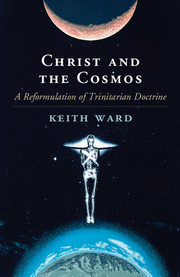Book contents
- Frontmatter
- Contents
- Preface
- Acknowledgements
- PART I THE THREEFOLD NATURE OF THE DIVINE BEING
- PART II THE BIBLICAL SOURCES OF TRINITARIAN THOUGHT
- PART III THE TRINITY, IMMANENT AND ECONOMIC
- 11 Why Three?
- 12 The Trinity and Revelation
- 13 Hegel and Modern Theology
- 14 The Immanent Trinity
- 15 The Identity of the Immanent and the Economic Trinity
- 16 Hegel Again
- 17 What Creation Adds to the Trinity
- 18 The Epistemic Priority of the Economic Trinity
- 19 The Trinity and Naive Realism
- 20 The Trinity and the Cosmos
- 21 Revelation and the Immanent Trinity
- PART IV THE SOCIAL TRINITY
- PART V THE COSMIC TRINITY
- Bibliography
- Subject Index
- Name Index
21 - Revelation and the Immanent Trinity
from PART III - THE TRINITY, IMMANENT AND ECONOMIC
Published online by Cambridge University Press: 05 September 2015
- Frontmatter
- Contents
- Preface
- Acknowledgements
- PART I THE THREEFOLD NATURE OF THE DIVINE BEING
- PART II THE BIBLICAL SOURCES OF TRINITARIAN THOUGHT
- PART III THE TRINITY, IMMANENT AND ECONOMIC
- 11 Why Three?
- 12 The Trinity and Revelation
- 13 Hegel and Modern Theology
- 14 The Immanent Trinity
- 15 The Identity of the Immanent and the Economic Trinity
- 16 Hegel Again
- 17 What Creation Adds to the Trinity
- 18 The Epistemic Priority of the Economic Trinity
- 19 The Trinity and Naive Realism
- 20 The Trinity and the Cosmos
- 21 Revelation and the Immanent Trinity
- PART IV THE SOCIAL TRINITY
- PART V THE COSMIC TRINITY
- Bibliography
- Subject Index
- Name Index
Summary
God truly is Father, Son, and Spirit as God truly relates to human beings. But just suppose there are non-human beings in existence, whether angels or alien life forms. Would God truly be to them a male member of the species homo sapiens, his male offspring, and a being which often takes the form of a bird? You may rightly say that it would be a travesty to think that any educated Christian thinks that is what the Trinity really is. Yet in Christian art, God is often depicted as a bearded male and the Spirit as a dove. These may be just symbols, though sometimes even theologians seriously argue that God must only be depicted as male (God, others insist, should not be depicted at all!). The real point is that male gender is a characteristic of bisexual mammals, that the idea of being a son would only make sense where the origin of a life was the result of sexual reproduction, and that birds are one sort of biological entity that may be confined to the planet earth. These symbols could only apply where there was bisexual reproduction and winged flight. Of course they make some sort of sense on this planet, even though they still produce the danger of over-literalist thinking about God. But are we to insist that the only acceptable ways of conceiving a God who has created millions of stars and galaxies are ways that make sense on this small planet? If we are asking about the nature of an immanent Trinity, does it make sense to say that the only acceptable representation is limited to the biological forms existing on a small planet on the periphery of a fairly average galaxy?
Attempts to use expressions such as ‘Creator, Redeemer, and Sanctifier’ for God are attempts to escape the gender and species limitations of our images of the divine, and they could be understood by many different sorts of intelligent beings, who probably have different specific images of the divine as it relates to them. I am not suggesting that we stop speaking of Father, Son, and Spirit.
- Type
- Chapter
- Information
- Christ and the CosmosA Reformulation of Trinitarian Doctrine, pp. 137 - 142Publisher: Cambridge University PressPrint publication year: 2015



